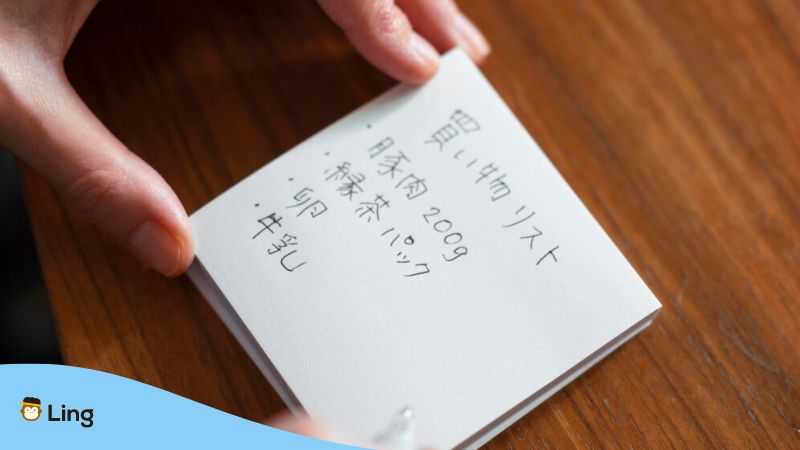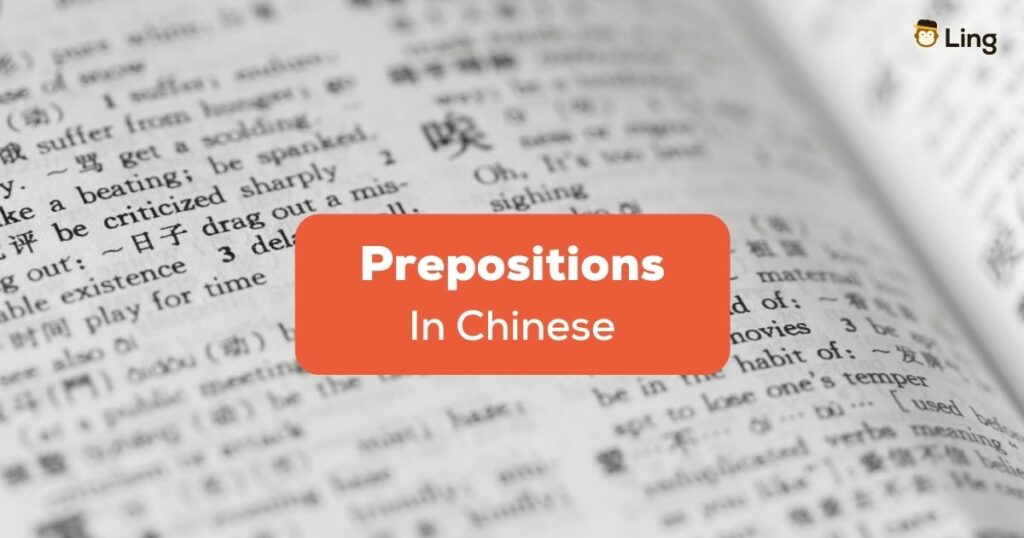Chinese prepositions can be a little tricky. They’re often used in ways that are similar to English prepositions, but they also have their own unique meanings and uses. If you’re not quite sure how or when to use them, this post will help you get started.
We’ve rounded up 10+ Chinese prepositions that will help you say exactly what you mean—and we promise they won’t be as complicated as they seem. So what are you waiting for? It’s time to learn Chinese!
What Are Prepositions?
Prepositions are words or phrases that show the relationship between two words in a sentence. Moreover, they link nouns and pronouns to other words. They’re used to indicate time, place, and direction.
In English, we use prepositions all the time without even knowing them. Some common prepositions in English include: at, by, for, from, in, of, on, over, under, and with. For example, if you say, “The cat is under the table,” then “under” is a preposition because it describes the cat’s location.
Prepositions are pretty easy to understand once you know what they mean. But sometimes it can be difficult to know which preposition should be used for a particular situation! Chinese has many cool prepositions of its own—some of them can make your life much easier when you’re trying to communicate with others!
What Are Chinese Prepositions And Why Should I Know Them?
Chinese prepositions are important words that function like English prepositions. They’re also used to indicate various relationships between words, such as location, direction, or time.
Chinese prepositions are a great way to add a little flair to your Chinese grammar skills. They can help you make sentences more specific, exciting, and interesting.
You might think learning Chinese prepositions is difficult or unnecessary – a lot of people think learning Chinese is hard– but they are very easy to learn once you understand the basics. It’s all about understanding what each preposition means and when to use it in sentences.

Common Chinese Prepositions And How To Use Them
Chinese prepositions are a great way to add nuance to your grammar. The most common Chinese prepositions are those that help describe a relative location, but there are other prepositions in the language that can help you communicate more accurately and clearly.
Here are some of the most common ones you’ll want to know!
At – 在 (Zài)
At is a preposition that indicates the location of an object or person. You can use it to describe where you are, where something is, or where someone is. It’s often used to talk about locations in time (like when you’re going to be somewhere) and locations in space.
Here are examples of how you can use zài in your sentences:
- I am at home. – 我在家。(Wǒ zài jiā.)
- I’m going home at five this afternoon. – 我今天下午五点回家。(Wǒ jīntiān xiàwǔ wǔ diǎn huí jiā.)
Before – 前 (Qián)
One of the most common Chinese prepositions is 前, which means “before” and can be used at the beginning or end of a sentence to indicate, among other things, time, location, and order.
The preposition “before” may also function as a noun. Thus, if you’re just starting off, try to figure things out from the surrounding text.
For example: Wash your hands before meals. – 饭前洗手。(Fàn qián xǐshǒu.)
As you can see, the time reference comes first, followed by the preposition and then the verb. Keep in mind that the standard order of a Chinese sentence is subject-verb-object.
Than – 比 (Bǐ)
The word 比 is a preposition that means “than” in Chinese. It’s used to compare one thing or person to another.
Here are examples of how you can use 比 in your sentences:
- You are older than me. – 你的年纪比我大。(Nǐ de niánjì bǐ wǒ dà.)
- This school is better than that school. – 这个学校比那个学校好。(Gè xuéxiào bǐ nàgè xuéxiào hǎo.)
But, beginners may be confused with the sentence arrangement. In English, the adjective comes before “than.” However, in Chinese, the term 比 comes first.

Of – 的 (De)
Of 的 (de) is a very useful preposition, and one of the most common in Chinese. It’s used to indicate possession and ownership. Moreover, 的 can be used as a possessive pronoun, replacing the English word “my.” For example:
- You are my friend. – 你是我的朋友。(Nǐ shì wǒ de péngyǒu.)
- This is my library card, would you like to borrow it? – 这是我的借阅卡,你要借么? (Zhè shì wǒ de jièyuè kǎ, nǐ yào jiè me?)
For, In Order To – 为了 (Wèi le)
为了 (Wèi le) are Chinese characters that mean ‘for.’ This preposition phrase is used to express the purpose of an action. It can be translated as “in order to,” or “for the purpose of.” Take the following sentence as an example:
- I get up early every morning for my parents. – 我每天早上起得很早 为了我的父母。(Wǒ měitiān zǎoshang qǐ dé hěn zǎo wèile wǒ de fùmǔ.)
Moreover, it is often used in conjunction with other verbs to describe what someone did or will do in order to achieve a particular goal. For example:
- He works hard in order to make money. – 他努力工作为了赚钱。(Tā nǔlì gōngzuò wéi le zhuànqián.)
Outside – 外 (Wài)
外 (wài) is a Chinese preposition that indicates “outside.” It can be used as a prepositional phrase to indicate where something is located relative to another object. It’s pretty straightforward, and it’s used in a lot of situations.
Here is an example of how you can use 外 in your sentences:
- I’m waiting for you outside. – 我在外面等着你。(Wǒ zài wàimiàn děngzhe nǐ.)

Except – 除了(Chú Le)
It’s not uncommon for a Chinese preposition to have several meanings, but 除了 (chú le) is one of the most versatile. It can mean “except,” but it can also mean “other than” or “apart from.” Here are some example sentences:
- I don’t know anyone except Mr. Wang. – 我不知道没有谁除了王先生。(Wǒ bù zhīdào méiyǒu shéi chúle wáng xiānshēng.)
- Apart from him, I have no other friends. – 除了他,我没有其他朋友。(Chúle tā, wǒ méiyǒu qítā péngyǒu.)
Among, Between – 之间 (Zhī Jiān)
Among, between 之间 (zhī jiān) is a preposition that means “in the midst of.” It’s used to refer to relationships between things, and people and their spatial relationship. For example:
- There is a big difference between them. – 他们之间有很大的区别。(Tā men zhī jiān yǒu hěn dà de qū bù.)
To – 对 (Duì)
The Chinese preposition “to” is a bit of a tricky one to translate into English, but it’s easy to understand once you learn how it works. The basic idea is that 对 means “to” when referring to a person or thing, and it means “of” when referring to an action or event.
When you’re using 对 as a preposition, it’s usually paired with another word: either a noun or a verb. For example:
- I’m going over there to the store. – 我往那里去对店里去。(Wǒ wǎng nàlǐ qù duì diàn lǐ qù.)
With – 跟 (Gēn)
跟 (Gēn) is a very simple Chinese preposition that you’ll use a lot! It means “with,” and indicates who or what you’re doing something with. Let’s take a look at some examples:
- I went to school with him. – 我跟他一起去上学了。(Wǒ gēn tā yīqǐ qù shàngxuéle.)
- I will go with you. – 我跟你一起去。(Wǒ gēn nǐ yīqǐ qù.)
Other Chinese Prepositions You Need To Know
Here’s a list of some other Chinese prepositions you should know:
Master Chinese Prepositions
Chinese prepositions are the glue that holds together countless words, phrases, and sentences. Without them, you’d be lost!
It can be hard to make sense of what you’re hearing or reading if you don’t know which preposition goes where and when. And if you don’t know how to use Chinese prepositions, you’ll miss out on some great opportunities to express yourself clearly and precisely.
So, it’s important to get a handle on these little words. They can do wonders for your Chinese fluency and help you better express yourself. And, if you’re interested in learning more about Chinese grammar and other aspects of language learning, check out the Ling App!
Learn Chinese With Ling
The Ling App is an easy-to-use mobile app that helps you learn Chinese. It’s a great tool for beginner students who want to improve their fluency, intermediate learners who want to perfect their Chinese skills, and advanced students who are looking for ways to expand their vocabulary and grammar knowledge.
With interactive quizzes and a variety of learning modes, this app is sure to help you become a better Chinese speaker. So, what are you waiting for?
Download the Ling App on App Store and Play Store now!




































































